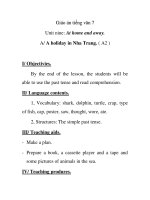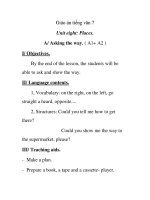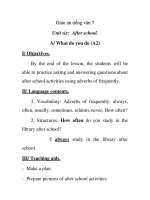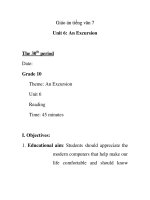Giáo án tiếng anh lớp 7: Unit six: After school ppsx
Bạn đang xem bản rút gọn của tài liệu. Xem và tải ngay bản đầy đủ của tài liệu tại đây (107.73 KB, 45 trang )
G
G
i
i
á
á
o
o
á
á
n
n
t
t
i
i
ế
ế
n
n
g
g
v
v
ă
ă
n
n
7
7
Unit six: After school.
A/ What do you do (A2)
I/ Objectives.
By the end of the lesson, the students will be
able to practice asking and answering questions about
after school activities using adverbs of frequently.
II/ Language contents.
1, Vocabulary: Adverbs of frequently: always,
often, usually, sometimes, seldom, never, How often?
2, Structures: How often do you study in the
library after school?
-I always study in the library after
school.
III/ Teaching aids.
- Make a plan
- Prepare pictures of after school activities.
IV/ Teaching procedures.
Stages Teacher’s activities Students activities
1, Warm
up.
2,
Presentati
on
Make questions for
students to check old
lesson and introduce the
new lesson: -What does
Minh do after school? -
What does Hoa do after
school? -What sports
does she like playing?
Now you look at these
pictures and answer the
questions for each
picture: What are they
doing?
Where are they?
Go to board and
answer the teacher’s
questions.
Look at those pictures
and do teacher’s
requests.
_They are studying in
the library.
-
They sometimes
When do you
often study?
Do you often
play it?
For the first picture has
done for the students,
ask them to work in
pairs by making
questions and answering
Listen to students and
correct their mistakes if
they have.
Introduce adverbs of
frequently( read and
write ): always, often,
usually, sometimes,
seldom, never.
study.
Show each picture to
ask and answer the
questions.
Read these adverbs.
Make sentences.
Work in pairs.
3,
Practice.
Make a sentence for the
first picture
They always study in the
library.
Have students replace “
always” by other
adverbs.
Make questions: How
often do they study in
the library?
Ask students to work in
pairs.
*Now talk about you:
What do you usually do
after school?
How often do you
after school?
By the students.
Practice in front of the
class.
Read and write.
I always
stay with my
uncle at weekends.
Mai never
goes
swimming.
4,
Productio
n.
5,
Have students use other
activities to practice: go
to the movie, visit one’s
grandparents, do
housework
*Make new sentences:
-I/ always/ stay/ uncle/
weekends/.
-Mai/ never/ go
swimming/.
-My brother/ usually/
watch TV/ evening/.
Ask students to make
questions for the
underline words.
Listen and correct their
My brother usually
watches TV.
How often do you
stay
with your uncle?
After that they practice
with a partner.
Listen to teacher.
Make a survey.
Practice with a partner.
Rewrite into the
notebooks.
Homewor
k
mistakes.
@ Use the structure that
you have learn to make a
survey.
Write 5 sentences about
you to answer the
question: What do you
usually do after school?
Other student uses the
friend’s survey to speak:
I and my friend usually
read the books after
school.
Learn by heart.
Talk about you.
Do exercise 3( 28- sbt )
Prepare the next lesson.
V/ Draw experience
Unit six: After school.
A/ What do you do? (A3 + A4 +A5)
I/ Objectives.
By the end of the lesson, the students will be
able to read for comprehension to answer the
questions and listen for specific information.
II/ Language contents.
1, Vocabulary: Pastime, rehearse, school
anniversary celebration, president of the stamp
collector’s club, sporty, lie.
2, Structures: Use the present simple tense.
III/ Teaching aids.
- Make a plan.
- Prepare pictures of Nga, Nam and Hoa’s activities.
IV/ Teaching produres.
Stages Teacher’s activities Students’ activities
1, Warm
up
2,
Presentati
Make questions for
students:
-Do you like playing
soccer?
-How often do you play
it?
-What do you usually
do after school?
There are many
activities to do after
Answer theses
questions.
( By students)
Can guess.
Look at the book .
on
school. Do you know?
Now you read the
passage that is in the
book and answer the
question: What does
each student do after
school?
Ask students to look at
these pictures and
answer the questions”
-What is Nga doing?
She is rehearsing a play
for the school
anniversary celebration.
Explain these words:
rehearse, play,
anniversary,
Listen and answer the
teacher’s questions.(
Can answer by
Vietnamese).
Listen and repeat the
words that were given
by the teacher.
Answer and write.
celebration.
-What is Ba doing? He
is seeing the stamps. He
is the president of the
stamp collector’s club.
Guide reading these
words: stamp,
president, collector,
club.
-What is Nam doing?
He is lieing on the
couch and watching
TV. He is not very
sporty.
Explain the word: lie,
sporty.
Guide all the words.
Read all the words.
Listen to the tape and
repeat it.
Read in front of the
class.
Answer these questions.
3, Practice
Ask students to look at
the books and listen to
the tape, then repeat
Call some students to
read.
Correct their mistakes if
they have
And help them to find
other new words, and
explain them.
Make questions for
students:
-What does Nga like
doing after school
hours? She likes acting.
-What do Ba and his
friends often do on
Note these new words.
Read the text again.
Work in pairs by asking
and answering the
questions.
Practice in front of the
Wednesday afternoons?
They get together and
talk about their stamps.
-What does Nam do
after school hours? He
often watches videos,
reads a library book or
comics, or lies on the
couch in front of the
TV.
Ask students to read
again the reading. Then
let them to work in
pairs by answering the
questions that are in the
book.
Call some groups to
practice in front of the
class.
Listen to teacher.
Listen to the tape.
Go to the board and
match.
4,
Productio
n
class.( Can play a game
noughts and crosses for
each group).
You’ve just know what
Ba, Nam and Nga do
after school hours.
What about other
students, exactly Mai,
Nam, Ba, Lan and
Kien? What do they do
after school? Now you
listen to the tape and
match each name to an
activity.
Ask students look at the
book and repeat these
words that are in the
books.( Can ask them to
Answer these questions.
Work in pairs.
Talk about you by
asking these questions.
Ask the other friend.
5,
Homewor
k.
guess)
Play the tape twice and
call a student to match.
Pay the tape again to
check.
Then make a question
for each student: What
does Mai do after
school hours? She goes
to school cafeteria.
Have them work in
pairs.
@Now talk about you.
-What do you do after
school hours?
-How often do you do
that?
Play this game.
Rewrite these exercises
into your notebooks.
-When do you do it?
-What activities do you
like best?
Show the student who
has just told and ask:
What does he/ she do
after school hours? Etc.
Use some pictures to
match and talk: who
and what does he/ she
do after school hours?
*Learn by heart the new
words.
Read again the reading
and write the answers
into your notebooks.
Write 5 sentences about
you.
V/ Draw experience
Unit six: After school.
B/ Let’s go! ( B1)
I/ Objectives.
By the end of the lesson, the students will be
able to use the structures for making, accepting, and
refusing invitations.
II/ Language contents.
1, Vocabulary: assignment, relax.
2, Structures: What about going to the movies?
Let’s go to my house!
Why don’t you relax?
III/ Teaching aids.
- Make aplan.
- Prepare some pictures of after school activities.
IV/ Teaching produces.
Stages Teacher’s activities Students’ activities
1, Warm
up
@Now you remind the
old lesson and answer
the questions:
What does Nga do after
school?
Does Ba like collecting
the stamps
Is Nam very sporty?
What does Nam do
after school?
Remind the old lesson
and answer the
teacher’s questions.
She rehearses a play.
Yes, he does.
No, he isn’t.
He usually goes home
and watches TV.
( By the students)
Listen and look at the
2,
Presentati
on
What about you?
@ You have just talk
about some after school
activities. Today we
continue talking about
other activities, now
you look at this picture
and you guess what
they are doing?
Introduce the new
lesson by making
questions: How many
students are there in this
picture? Who are they?
Tomorrow is Sunday.
They are talking about
what they should do in
picture that is in pages
64.
Guess: They are
listening to music.
-There are four: Ba,
Nam, Hoa and Lan.
Listen to the tape.
3, Practice
this evening. Now listen
to the tape and answer
that question.
Play the tape twice and
ask them to repeat it.
Call four students to
read .
Explain the new words:
to be on, relax,
assignment.
-What about + V-ing ?
-Why don’t you +
V ?
-
Let’s +V
Invitations.
Accepting: Great or Oh,
I’d love to.
Practice in front of the
class.
Listen and write.
Work in pairs.
Practice in front of the
class.
4,
Productio
n
Refusing: I’m sorry.
Ask them to work in
pairs by answering the
questions that are in the
book.
Go around the class to
help students
Then have them
practice in front of the
class.
Listen and give the key.
-Nam wants to go to the
movies.
-Because there aren’t
any good movies at the
moment.
-Lan wants to listen to
Write into the
notebooks.
Listen to carefully.
Play this game.
Stick these small papers
so that they are correct
5,
Homewor
k
music at her home.
-Because she has so
many assignments.
-It’s Saturday.
@ Use the pictures of
four students and small
papers to stick on the
board:
Nam : doesn’t want to
go to movie
Ba :doen’t want go to
Lan’s house
Hoa: wants to listen to
music
Lan: wants to go to the
movies
Now you answer the
sentences.
Answer this question
Make invitations
Listen to and rewrite
them into your
notebooks.
question: What does
Nam/ Ba/ Hoa/ Lan
want to do?
Now you make
invitations with a
partner, using : -
Let’s
-What
about
-Why
don’t you
@ Write questions into
notebooks.
Imagine you won’t
have any lessons
tomorrow. You make
some invitations with
your friends to relax.
V/ Draw experience.
Unit six: After school.
B/ Let’s go!
I/ Objectives.
By the end of the lesson, the students will be
able to read for comprehension and discuss after-
school activities in America.
II/ Language contents.
1, Vocabulary: teenager, attent, youth,
organization, scout, guide, musical instrument, coin,
model, plane,
2, Structures: What do American teenages like
doing in their free time?
-They like attending youth organizations
such as scouts and guides .
III/ Teaching aids.
- Make a plan.
- Prepare the pictures of American teenagers’
activities.
IV/ Teaching procedures.
Stages Teacher’s activities Students’ activities
1, Warm
up.
@Make questions for
students: What do you
usually do after
school? (you can speak
5 activities).
Answer this question(
can use these words:
play soccer, watch TV,
collect stamps, talk,
skip- rope )
2,
Presentatio
n
Now you can talk
about organizations of
Vietnamese teenagers.
Introduce words:
organization, teenager,
youth.
@ Ask students look at
these pictures in pages
65 and talk about
them: they are the
most popular after-
school activities in
America. Can you
guess what these
activities are.
- eat and drink.
- Watch TV.
By Vietnamese.
Look at these pictures.
And guess.
Look at these pictures
and talk about them.
Read again these









